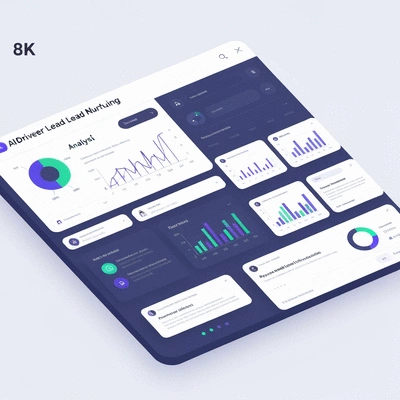Step 1Define & Personalize
Use AI to tailor communications based on user behavior, preferences, and demographics.
Are you ready to transform your approach to lead nurturing? With AI-driven strategies, the landscape of customer engagement is evolving, offering personalized experiences that resonate deeply with prospects. Discover how to harness these techniques and watch your conversion rates soar!
This diagram illustrates the sequential steps and key strategies involved in an effective AI-driven lead nurturing campaign, from initial engagement to conversion.
Use AI to tailor communications based on user behavior, preferences, and demographics.
AI analyzes data patterns, predicts behaviors, and identifies high-value leads for better targeting.
Implement automated email sequences and drip campaigns based on user behavior.
Centralize lead data for holistic views and streamlined follow-ups to track success.
As a business strategist at My AI Business Coach, I understand the importance of effective lead nurturing. AI-driven approaches not only help simplify this process but also personalize it in ways that resonate with potential customers. Let's dive into what personalized lead nurturing with AI really means and why it's a game-changer for small to medium-sized businesses.
Personalized lead nurturing refers to the use of artificial intelligence to tailor communications and marketing efforts to individual prospects. This process involves analyzing data about customer behaviors, preferences, and demographics to create a more engaging experience. By leveraging AI, businesses can automate interactions that feel personal and relevant, enhancing the overall customer journey. It's important to note that AI is poised to profoundly shape the future of marketing, making these strategies even more crucial.
In my experience, these tailored interactions lead to higher engagement rates. When customers feel seen and understood, they're more likely to convert.
Personalization is crucial in lead nurturing because it builds trust and rapport with potential clients. When people receive communications that resonate with their specific needs or interests, they are more likely to engage further. It’s not just about selling a product; it’s about fostering a relationship that ultimately drives conversions. Research indicates that the use of AI in marketing can lead to significant improvements in customer engagement and loyalty.
At My AI Business Coach, we've seen firsthand how personalized approaches can transform cold leads into loyal customers!
AI algorithms play a pivotal role in optimizing lead nurturing efforts by analyzing data patterns and predicting future behaviors. These insights allow businesses to tailor their marketing strategies accordingly. For instance, AI can evaluate which content resonates best with specific segments, enabling you to craft more targeted messages. The growing trend of hyper-personalization through AI is revolutionizing how businesses connect with their audience.
By harnessing these algorithms, businesses can not only improve their efficiency but also enhance their ability to nurture leads effectively.
Now that we’ve established the importance of AI-driven lead nurturing, let’s explore some effective strategies for implementation. My AI Business Coach provides actionable insights to guide you through this process.
To fully leverage AI in lead nurturing, businesses should adopt behavior-based personalization techniques. This approach focuses on analyzing user actions to create tailored messaging that speaks directly to their interests.
Understanding how leads interact with your content provides valuable insights. By tracking behaviors such as page visits, email opens, and click-through rates, you can refine your messaging to be more relevant.
Segmenting leads based on their engagement stage allows you to deliver appropriate content at the right time. For instance, new leads may need introductory materials, while warmer leads may benefit from case studies or testimonials. This targeted approach maximizes the impact of your outreach.
Implementing these techniques can significantly boost your lead nurturing efforts!
Automation is another key area where AI can enhance lead nurturing, making it easier to engage leads consistently and efficiently.
Predictive lead scoring uses AI to assess which leads are more likely to convert. This allows your team to focus its efforts on those leads, optimizing your resources and time.
Automated email sequences can nurture leads without constant manual effort. By setting up a series of strategic emails, you can keep your brand top-of-mind for potential customers.
Drip campaigns involve sending a series of automated messages based on user behavior or time intervals. This method keeps leads engaged over time, providing them with valuable content to guide them through their decision-making process.
By integrating these automation strategies, you’ll enhance your lead nurturing process and see improved results!
In this section, we’ve explored how AI-driven lead nurturing can empower your business through personalization and automation. As we move forward, keep in mind that understanding these principles will set the foundation for creating effective campaigns that resonate with your audience.
Here's a brief recap of the key points discussed so far:
As we navigate the evolving landscape of marketing, it's clear that personalized AI-driven lead nurturing offers significant advantages. By tailoring our approaches to meet the specific needs of potential customers, we can foster deeper connections and drive better results. Let’s dive into how these methods enhance our marketing strategies!
One of the most notable benefits is the enhanced conversion rates that stem from tailored engagement. When our messaging resonates with the audience, it leads to higher engagement, ultimately transforming leads into loyal customers. This is not just a theoretical concept; numerous studies have shown that personalization can dramatically uplift conversion rates across various industries.
When we implement personalized AI-driven lead nurturing, we see a direct impact on our conversion rates. Here are some key factors that contribute to this phenomenon:
In my experience with My AI Business Coach, these tailored approaches have proven effective in converting leads into paying clients. By utilizing AI to analyze customer behavior, we can deliver the right messages to the right people at the perfect time.
Another significant benefit of personalized lead nurturing is the way it improves customer experience. By leveraging AI insights, we can create a more seamless journey for leads. Here are a few ways AI enhances the customer experience:
This personalized customer experience not only leads to higher satisfaction but also encourages repeat business—something every business owner strives for!
Lastly, integrating a robust Customer Relationship Management (CRM) system plays a vital role in effective lead nurturing. Here’s how a solid CRM supports our efforts:
At My AI Business Coach, utilizing a comprehensive CRM has allowed us to nurture leads effectively, improving our response rates and overall engagement.
Now that we've explored the benefits, let’s discuss the next steps for marketers looking to implement AI in their lead nurturing strategies. The journey begins with choosing the right tools!
Selecting the right AI tools can be overwhelming, but focusing on specific features can help narrow your choices. Consider the following:
With a clear understanding of your needs, you can find tools that enhance your lead nurturing efforts without complicating your workflow.
To kickstart your AI personalization journey, here are a few actionable tips:
These initial steps can pave the way for more advanced AI strategies that drive even greater results!
Finally, integrating CRM software is crucial for managing your leads effectively. Here are some key benefits:
At My AI Business Coach, we’ve seen firsthand how effective CRM integration can transform lead management, making nurturing efforts more efficient and successful.
Here is a quick recap of the important points discussed in the article:



 Have you ever wondered how artificial intelligence can reshape consumer behavior and decision-making
Have you ever wondered how artificial intelligence can reshape consumer behavior and decision-making
 As the digital landscape evolves, small businesses are discovering that artificial intelligence is n
As the digital landscape evolves, small businesses are discovering that artificial intelligence is n
 Did you know that personalized marketing can lead to a revenue increase of up to 30%? In an era wher
Did you know that personalized marketing can lead to a revenue increase of up to 30%? In an era wher
 Are you aware that reactivating dormant customers can significantly enhance your business growth? Ma
Are you aware that reactivating dormant customers can significantly enhance your business growth? Ma